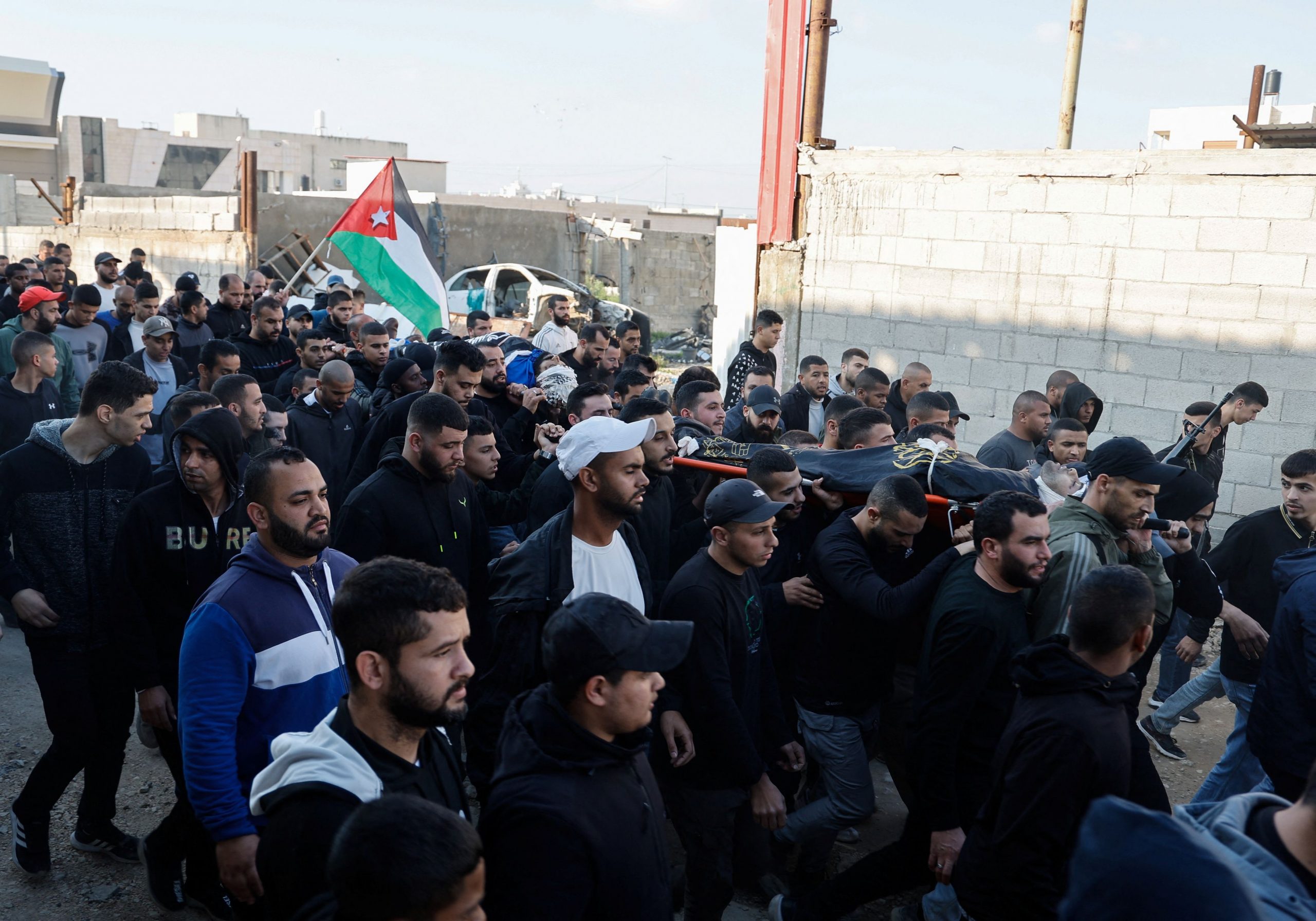RAMALLAH, West Bank—The Israeli-occupied West Bank has become an increasingly deadly front in a Middle East conflict that has spread beyond the war in Gaza, with near-daily Israeli raids into Palestinian villages and cities which Israel says are aimed at uprooting growing militant activity and preventing new attacks.
Early on Friday, Israeli security forces ended a two-day raid in Tulkarem, a West Bank city straddling the wall separating Palestinian communities and Israel that hasn’t been known as a hotbed of militancy in recent years, leaving at least eight Palestinians dead.
The raids, which lasted 45 hours, occurred in the city and its two refugee camps, Tulkarem and Nour Shams, where residents said Israeli forces destroyed homes and damaged infrastructure, including roads. The Israeli military said it destroyed 400 explosives and five bomb factories, questioned hundreds of people and detained 37.
Since Israel launched its response to the deadly Hamas-led Oct. 7 attack, 357 Palestinians, of whom 90 were children, have been killed across the West Bank, including East Jerusalem, according to the United Nations. Five Israelis, including four members of the security forces, have been killed in the West Bank over the same period, the U.N. said.
Israeli security officials refer to the West Bank as a third front in the war, after Gaza and the country’s northern border with Lebanon, where Israeli forces clash routinely with Hezbollah fighters and Palestinian militants.
In Gaza, more than 24,600 Palestinians have been killed in the Israeli offensive since Oct. 7, most of them women and children, according to health authorities in the enclave. Thousands more are believed to still be buried under rubble.
Jordan on Friday accused Israel of deliberately attacking one of its field hospitals in Gaza, in Khan Younis.
“Israeli tanks strategically positioned near the hospital, with one tank blocking the hospital gate, fired directly at the facilities,” the Jordanian army said. The attack, which occurred on Wednesday, injured a Jordanian officer and a Palestinian patient and caused substantial damage to the hospital, the army said.
The Jordanian army said it was the fourth Israeli strike against one of its field hospitals in Gaza since the war broke out, and said it had been working with Israel to try to avoid such incidents. But the army said Israeli forces have persisted in “deliberately targeting Jordanian medical facilities on a consistent basis.”
The Israeli military didn’t immediately respond to a request for comment.
Jordan has historically had close security ties with Israel, and the kingdom was the second Arab state, after Egypt, to sign a peace accord with Israel, in 1994. But relations have cooled under the right-wing government of Israeli Prime Minister Benjamin Netanyahu, and Jordan withdrew its ambassador following Israel’s invasion of Gaza.
President Biden spoke with Netanyahu on Friday, and the White House said the leaders discussed freeing hostages still held in Gaza, Israel’s shift to more-targeted operations in Gaza and enabling more humanitarian aid to reach the enclave.
The call came a day after the Israeli leader signaled that his government wouldn’t restart a process leading to Palestinian statehood, rebuffing the Biden administration, which has said Israel won’t be safe until there is a two-state solution. “For any arrangement in the near future—with an arrangement, without an arrangement—the state of Israel must have full security control of all the territory west of the [River] Jordan. It’s an essential requirement and it contradicts the idea of self-rule [for the Palestinians],” Netanyahu said in a televised speech Thursday evening.
The White House said Friday’s call was pre-scheduled and not in response to Netanyahu’s comments. Later in the day, Biden said he still considered a two-state solution possible with Netanyahu in office.
“There are a number of types of two-state solutions. There’s a number of countries that are members of the U.N. that are still—don’t have their own militaries,” Biden said. “And so I think there’s ways in which this could work.”
Israel’s crackdown in the West Bank presents a security conundrum. Militants in the West Bank are fewer than in Gaza and not as well armed. Hamas has a more tenuous foothold there. But Israel says it is seeing a higher level of militant activity in the area and that its strikes are aimed at both thwarting imminent attacks and sending a message that it will respond forcefully to such activity. Some analysts, however, say the crackdown risks having the opposite effect by stoking militancy.
“Civilians are being killed in these raids, which seems to be inviting more people to join militant groups rather than the opposite,” said Khalil Shikaki, director of the Palestinian Center for Policy and Survey Research, a Ramallah-based think tank.
Shalom Ben Hanan, a former senior Israeli intelligence official, said that the level of militancy in the West Bank is at its highest level since the second intifada, which ran from 2000 to 2005, with hundreds of intelligence alerts about likely attacks from the West Bank every day. Many of these attempted attacks are thwarted by Israel in time, he said.
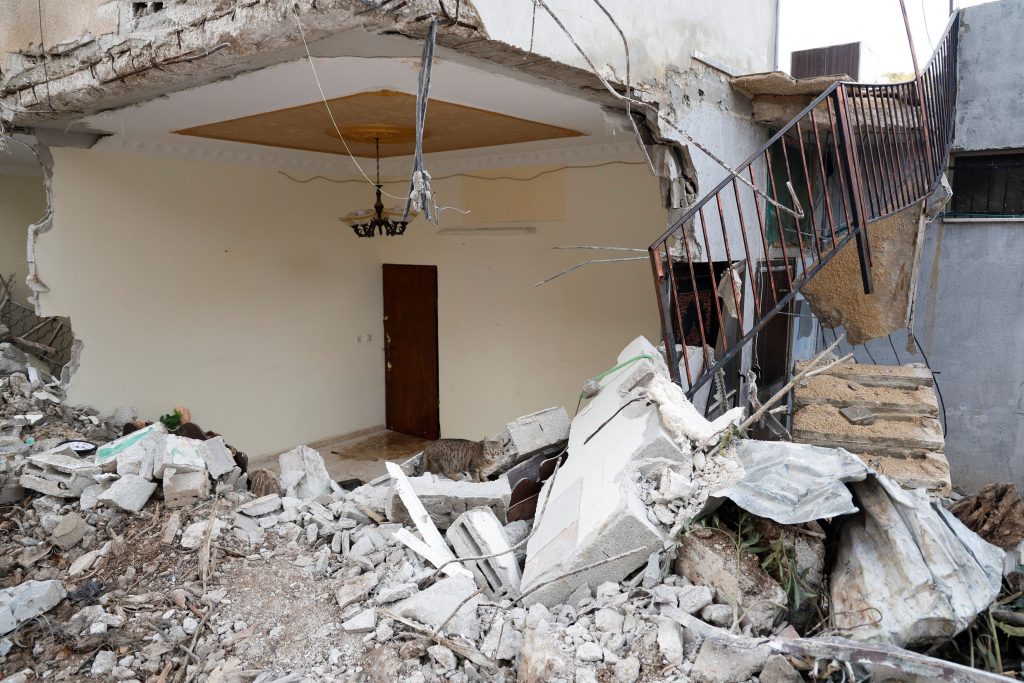
A cat stands on rubble after an Israeli raid, at Nour Shams refugee camp in Tulkarm, in the Israeli-occupied West Bank, January 18, 2024. REUTERS/Raneen Sawafta
In the past week, Israeli police arrested two Palestinians from the West Bank for allegedly ramming cars into pedestrians in central Israel, killing one woman and injuring at least 18 others. On Wednesday, the army said it killed militants in Nablus in the West Bank who it said planned to carry out a large-scale attack. The claim couldn’t be independently verified.
One resident of Tulkarem, a mother of four young children, said Israeli soldiers had entered her home and told her it was being used as a base for what they called terrorists, after which they tore her furniture apart and turned it upside down.
“This is all lies because they don’t know what they are looking for. All they want is to punish us for their failure in Gaza,” said the woman. “We are a family with children and an elderly woman, what could they possibly want from us?”
During clashes in Tulkarem, Palestinians threw pipe bombs and Israeli forces conducted airstrikes. The Israeli military said it had killed eight militants during the raids. The U.N. said at least two of those killed were children.
Israel says it has detained about 2,700 people throughout the West Bank since the start of the war, including over 1,300 who it says are linked to Hamas. The Palestinian Prisoners Society, a nongovernmental organization that supports detainees in Israeli prisons, says the number of Palestinians who have been detained by Israel in the West Bank since Oct. 7 is around 6,000.
Militant groups in the West Bank are widely localized, decentralized and loosely organized, analysts said.
“These young men aren’t looking to necessarily create a large-scale liberation movement. It’s a very nihilistic form of resistance,” said Tahani Mustafa, senior Palestine analyst with the International Crisis Group. She said some young Palestinians feel it is a worthy cause to die fighting the Israeli occupation, which they see as the root cause of their misery. “A lot of these young men feel like they are dead anyway,” she said.
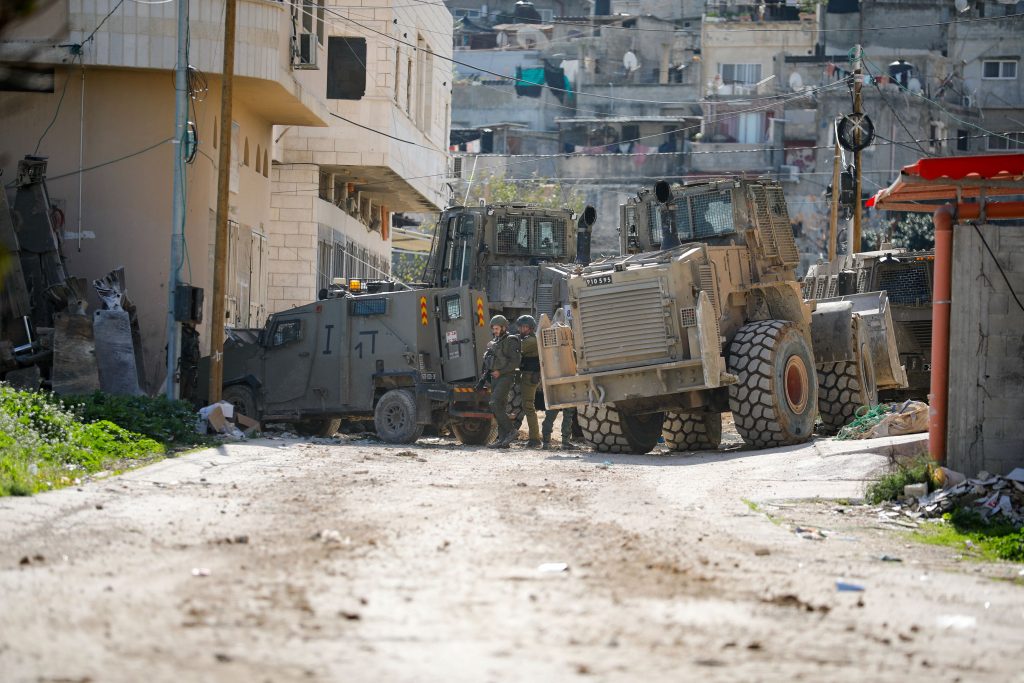
Soldiers stand on the street during an Israeli raid, in Tulkarm, in the Israeli-occupied West Bank, January 18, 2024. REUTERS/Raneen Sawafta
While a majority of Palestinians don’t support Hamas, polling shows that the Oct. 7 attack and the Israeli war in Gaza have increased the group’s popularity, particularly in the West Bank, where 75% prefer the group to remain in power in Gaza. By comparison, 36% of Gazans said they preferred Hamas to stay in power, according to a poll released by the PCPSR in December.
The war has also eroded the standing of the Palestinian Authority, which governs the West Bank and was widely unpopular among Palestinians before the current war partly due to its security coordination with Israel aimed at preventing violence.
Growing support for militancy in the West Bank, which had been quiet for months before Oct. 7, is partly due to the crackdown by Israeli forces, Mustafa said.
Jihad Harb, an independent political analyst in Ramallah, said Hamas enjoyed such support among West Bank Palestinians because many saw it as one of the few organizations willing to challenge the Israeli occupation, at a time when the prospects of a political solution have faded.
Militant groups in the West Bank, which some analysts say include hundreds of members, tend to be made up of ill-trained and ill-equipped Palestinians in their teens and 20s, many of whom live in densely populated and impoverished refugee camps.
“It’s the poorest who are in those areas now, with the lack of hope for the future, no work and no peace,” Harb said. “Either peace, or a challenge to the occupation, that’s what people want to see.”
Philippe Lazzarini, commissioner general of the U.N. agency for Palestinian refugees, said the number of Palestinians killed in the West Bank last year had tripled compared with 2022.
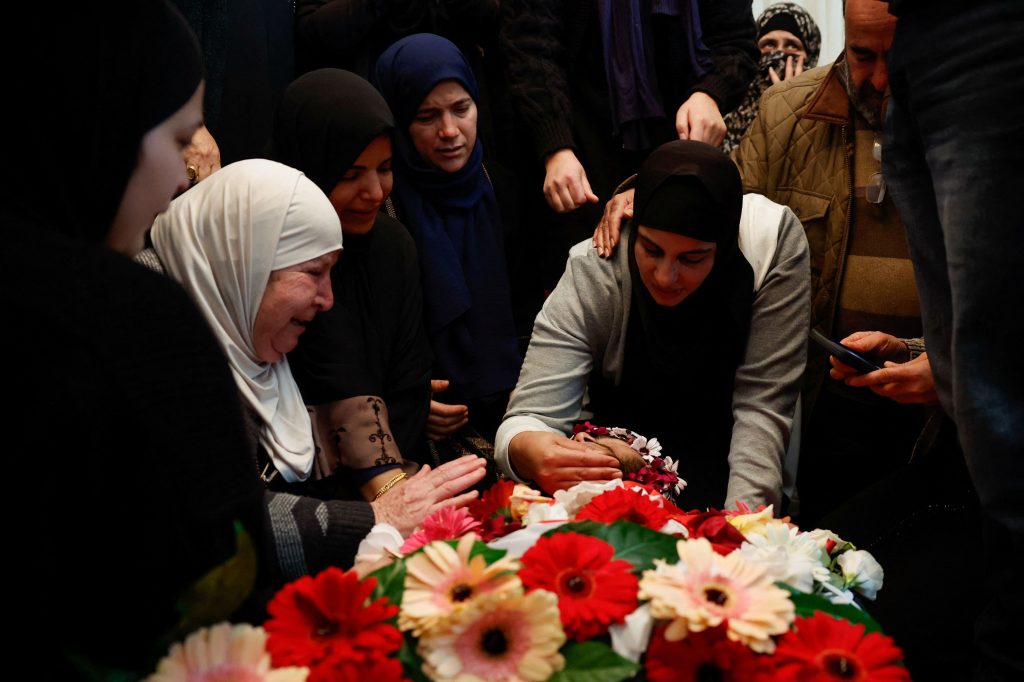
SENSITIVE MATERIAL. THIS IMAGE MAY OFFEND OR DISTURB Mourners react next to the body of American-Palestinian Tawfiq Ajjaq, 17, who according to Palestinian officials was killed by the Israeli security forces, during his funeral near Ramallah in the Israeli-occupied West Bank January 20, 2024. REUTERS/Mohammed Torokman
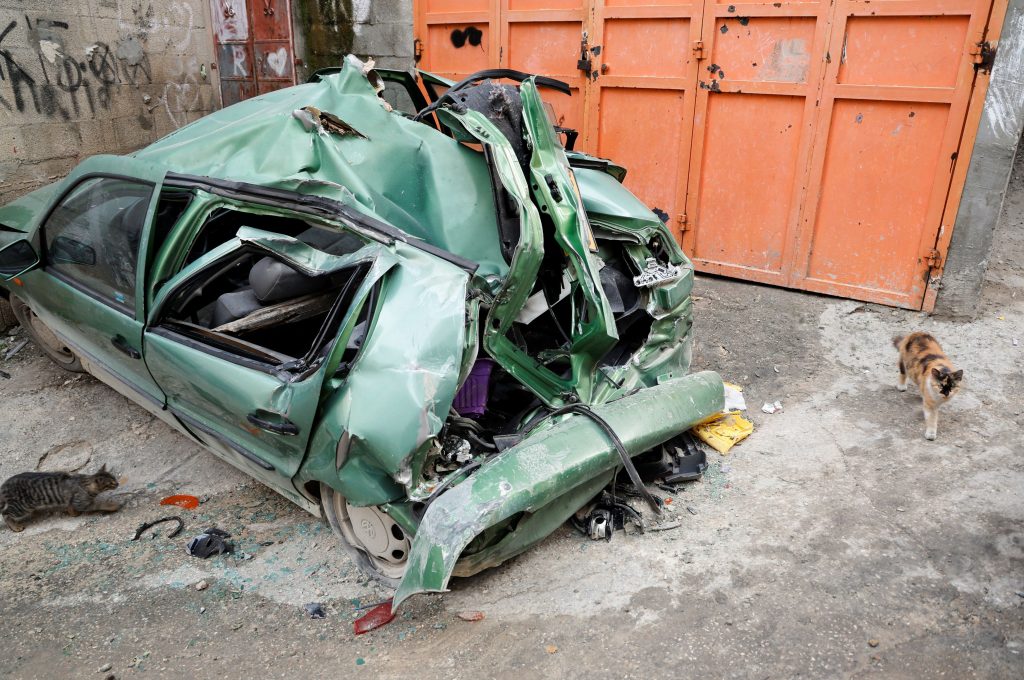
Cats walk near a damaged vehicle after an Israeli raid, at Nour Shams refugee camp in Tulkarm, in the Israeli-occupied West Bank, January 18, 2024. REUTERS/Raneen Sawafta
“It is hard to keep up with the lives lost given how pervasive violence has become,” Lazzarini said on X, the platform formerly known as Twitter. He said Israeli raids in the West Bank had caused severe damage to water and electricity networks and other infrastructure.
Refugee camps in the Palestinian territories are longstanding communities, initially set up to temporarily house hundreds of thousands of Palestinians who were driven from their homes during the 1948 Arab-Israel war following the establishment of the state of Israel. The camps aren’t tent cities but include more durable housing, albeit with poor infrastructure, and often schools and community centers.
New militant groups have formed in recent years, as the Palestinian-Israeli peace process has stalled, an increasingly right-wing Israeli government has empowered an imposing Israeli settler movement and the Palestinian political leadership has proven ineffective.
“There are really no viable alternatives that people see to changing the status quo of continued occupation and creeping annexation,” Shikaki said. “In this environment, Israel’s military means are able to achieve little.”
Michael Milshtein, a former head of the Department for Palestinians Affairs in Israeli military intelligence, said that Tulkarem was a “strong center of violence” during the second intifada and the home of a Hamas member who carried out one of the largest suicide bombings of that period, but that “in the last decade it was relatively quiet.” He said that in the past year or two, however, tensions had been growing there.
—Anat Peled and Sabrina Siddiqui contributed to this article.
Write to Sune Engel Rasmussen at sune.rasmussen@wsj.com and Omar Abdel-Baqui at omar.abdel-baqui@wsj.com
